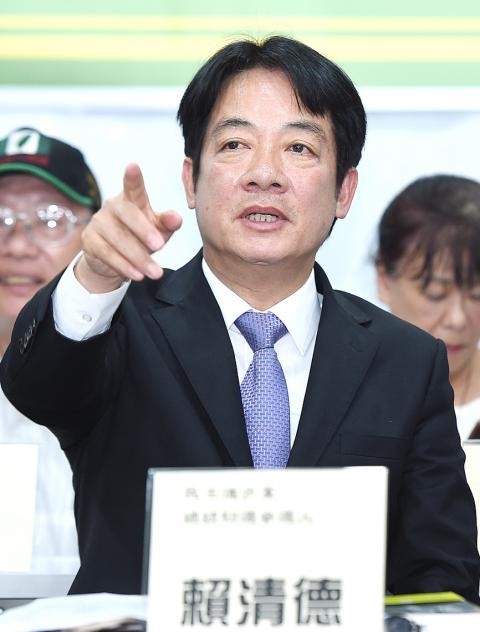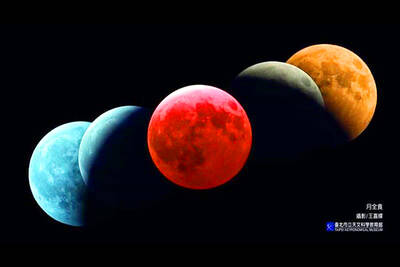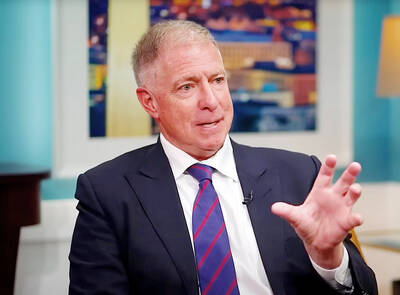Former premier William Lai (賴清德) yesterday urged the Democratic Progressive Party (DPP) to begin discussing its presidential primary and called for an “anti-annexation law” against China.
Lai said that when meeting with President Tsai Ing-wen (蔡英文), “there was no discussion on how to conduct a primary, only requests that I quit.”
“That is not the approach the DPP should take,” he added.

Photo: Liao Chen-huei, Taipei Times
If the party convenes a second meeting with him and Tsai, he hopes they will begin talking about a primary, Lai said.
He made the remarks at an event to oppose China’s annexation of Taiwan organized by a coalition of pro-independence groups in Taipei.
While the groups had invited primary candidates from all parties to share their view on countering the Chinese threat, only Lai attended, Taiwan Society chairman Chang Yeh-sen (張葉森) said.
Wu Hsiang-hui (吳祥輝), a political pundit, said he not only opposes China annexing Taiwan, but also opposes “President Tsai Ing-wen annexing Lai.”
Lai said that Tsai has so far not said she would support him if he won the primary, but has instead been making suggestions that someone should be running as a vice president,
“That is against the spirit of democracy,” Lai said, adding that a vice president should be determined after the primary.
“Emphasizing how someone should be a vice president during a primary is an election strategy not worth pursuing,” he said.
Since he has registered for the primary, he hopes to follow it through, Lai said.
As a democratic party, the DPP should adhere to its democratic procedures and allow primary candidates the opportunity to promote their platforms and lobby for support, he said.
“As a pragmatic political worker for Taiwanese independence, my national strategy is to promote stability in the nation and peace abroad,” he said.
To counter the Chinese Communist Party’s influence, the government should ensure the safety and sovereignty of Taiwan through increased collaboration with the US and other countries, he said.
It should also promote an anti-annexation law or anti-infiltration law, he said.
He urged people to think of the presidential and legislative elections next year as “a fight against China’s annexation and “one country, two systems” proposal, as well as a fight to ensure Taiwan’s sovereignty, human rights, and democratic and free way of life,” he said.
It would also be an opportunity to oppose a peace treaty with China, he said, adding that Beijing’s peace treaty with Tibet led to the exile of the Dalai Lama and the loss of many lives.
The experiences of Hong Kong and Tibet indicate that “the only path to happiness for Taiwan is independence and autonomy,” he said.
At a separate event in Taipei, Tsai told reporters that supporters would like to see Lai run as her vice president next year.
“One plus one is definitely bigger than two, and that is what our supporters hope to see,” she said.
Asked if she would like to meet with Lai soon, Tsai said she respects the party’s arrangements.
Asked about a rumor that the primary would be canceled due to pressure from her, the president said: “It is indeed a rumor — and a very malicious one.”

A total lunar eclipse coinciding with the Lantern Festival on March 3 would be Taiwan’s most notable celestial event this year, the Taipei Astronomical Museum said, urging skywatchers not to miss it. There would be four eclipses worldwide this year — two solar eclipses and two lunar eclipses — the museum’s Web site says. Taiwan would be able to observe one of the lunar eclipses in its entirety on March 3. The eclipse would be visible as the moon rises at 5:50pm, already partly shaded by the Earth’s shadow, the museum said. It would peak at about 7:30pm, when the moon would

DEFENSE: The US should cancel the US visas or green cards of relatives of KMT and TPP lawmakers who have been blocking the budget, Grant Newsham said A retired US Marine Corps officer has suggested canceling the US green cards and visas of relatives of opposition Taiwanese lawmakers who have been stalling the review of a proposed NT$1.25 trillion (US$39.7 billion) special defense budget. The Executive Yuan has proposed the budget for major weapons purchases over eight years, from this year to 2033. However, opposition lawmakers have refused to review the proposal, demanding that President William Lai (賴清德) first appear before the Legislative Yuan to answer questions about the proposed budget. On Thursday last week, 37 bipartisan US lawmakers sent a letter to Legislative Speaker Han Kuo-yu (韓國瑜), the heads

A New York-based NGO has launched a global initiative to rename the nation’s overseas missions, most of which operate under the name "Taipei," to "Taiwan Representative Office (TRO)," according to a news release. Ming Chiang (江明信), CEO of Hello Taiwan, announced the campaign at a news conference in Berlin on Monday, coinciding with the World Forum held from Monday through Wednesday, the institution stated in the release. Speaking at the event, Democratic Progressive Party Legislator Huang Jie (黃捷) said she believed this renaming campaign would enable the international community to see Taiwan

Two siblings in their 70s were injured yesterday when they opened a parcel and it exploded, police in Yilan said, adding the brother and sister were both in stable condition. The two siblings, surnamed Hung (洪), had received the parcel two days earlier but did not open it until yesterday, the first day of the Lunar New Year holiday in Taiwan, police said. Chen Chin-cheng (陳金城), head of the Yilan County Government Police Bureau, said the package bore no postmark or names and was labeled only with the siblings’ address. Citing the findings of a